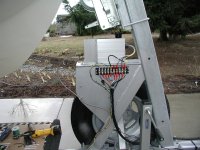I do not have E/H brakes and have towed both the 22 and 25 over most Western Grades, including to Prince Rupert. No problem with the Siskyiou. However I have seen a number of truckers smoke their brakes on this grade. The secret is as above. Slow down at the top of the pass. I often go down to 30 mph (by letting off the accelerator at the top--and then never letting the speed build up over 50). If you have to apply service brakes then only light taps, no prolonged heavy use after the speed has built up. Generally North Bound, on the Siskyiou, I apply the brakes once or twice. However, my current truck with 6 speed tranny and locking torque converter handles most of the breaking with the engine compression. I would check the temp of the discs and hubs at the end of the down grade--first rest stop. The only time I got into trouble is when I didn't do this on the down grade outside of Ogden UT S. Bound with the 25 (I 15). I had one of the axels disc's dragging and heated the bearings....Not entirely sure why that all happened. However this year, we did the same grade, with a single axle 22 and no heat up. So I conclude that there was a problem with the calipers not releasing on the other trailer (had those brakes rebuilt before the boat was sold).
As for the weight of the 22--we try and keep our below 4500 lbs scale weight including trailer (have weighed it) since we have a single axle trailer rated at 5000 lbs. We towed over 5000 miles so far this year, with no problems. We do check the bearings and wheels regularly, as well as regrease the bearings after every 2500 miles.
One of the members had a trailer reworked, and apparently the castle nuts were set up too tight. It not only caused heating of the bearings, but also decreased his fuel economy. This is one reason I use an IR thermometer, rather than just the finger test. The absolute temp is not as important as the comparison of other wheels, tires, hubs and brakes. (I check the truck as well as the trailer). To check the nuts, it is advisable to jack the tire off the ground, land be sure that the wheel spins freely. This only takes a few minutes, and can save a lot of heart ache, and sore back down the road!

